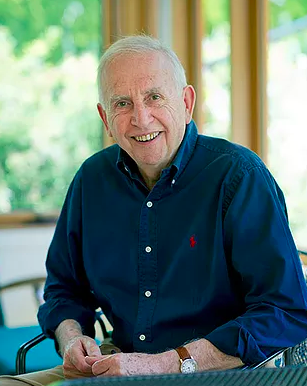[INTERVIEW] Hugh Mackay, 'The age of rampant materialism and individualism may be gradually coming to an end'
In his new book Beyond Belief, social researcher Hugh Mackay explores modern religion and spirituality. While he stops short of predicting a ‘religious revival’, Hugh tells Jessica Morris why he believes we’re becoming more spiritual than ever before.
What prompted you to write the book Beyond Belief?
Two things: First, as a social researcher, I have long been captivated by the number of contradictions in Australians’ attitudes to religion. While 61% identified themselves as ‘Christian’ in the last census, only 8% attend church weekly (15% once a month or so).
And yet, while church attendance has been going through the floor, attendance at church-based schools has been going through the roof and, when asked, a big majority of non-churchgoers say they like having a church in their neighbourhood. So the situation is obviously complicated enough to warrant some investigation!
Second, I have long felt that there must be a way to find common ground between people of goodwill, in spite of their different beliefs—those on a religious journey and those on a non-religious but spiritual journey—in their dreams of a better society. As long as we respect each other’s beliefs, our similarities far outweigh our differences.
What is the difference between religion and spirituality?
Religion implies some institutional structure—organisation, community, ritual, tradition, whereas spirituality is a more inward, personal concept. A spiritual experience is usually described as being mystical, transcendental, sublime or revelatory in some way, often associated with feelings of great calm, peace or tranquillity. It usually involves a deep sense that we are all connected.
Religious people often rely heavily on specific, dogmatic beliefs, whereas spirituality is more exploratory, subjective and dynamic—like faith itself.
"The main barrier between church and community is the sense that the church has stopped listening and responding to the needs of a changing society and is too preoccupied with the protection of its own ‘turf’."
Do you think people’s religious ideology has changed over time, or has the church become irrelevant?
With somewhere between three and four million Australians attending church reasonably regularly, we can hardly say the church is ‘irrelevant’ in contemporary Australian life, but many ex-churchgoers do cite ‘irrelevance’ as their reason for drifting away.
I suspect what’s really happening is that people’s view of God (or ‘a higher power’) is changing quite radically—away from a supernatural, out-there ‘God-being’ towards something more spiritual and internal—what Carl Jung described as ‘the God within’.
God as spirit; God as love...these concepts are more appealing (and perhaps more consistent with the spirit of the Gospels) to an increasingly well-educated and more sceptical society. The ‘higher power’ people are imagining may well be the power of loving-kindness within and among us.
In light of this, why do so few people attend church? What can the Christian community do to change this?
People who have stopped going to church don’t only speak of ‘irrelevance’. They have found church boring, have felt excluded, or they have found the insistence on specific, dogmatic beliefs (particularly belief in the literal, historical truth of the grand narratives of Christianity—virgin birth, bodily resurrection, miracles) a barrier to faith.
The main barrier between church and community is the sense that the church has stopped listening and responding to the needs of a changing society and is too preoccupied with the protection of its own ‘turf’—whether organisationally or doctrinally.
What is the future of religion and spirituality in Australia?
While I wouldn’t be predicting a religious revival, I am certainly of the view that the age of rampant materialism and individualism may be gradually coming to an end and we will see a renewed interest in community and spirituality.
Perhaps kindness and compassion will, once again, be rated more highly than wealth and possessions. To the extent that religion nurtures the spiritual life and encourages respect for the moral teachings of Jesus—in particular, the redefinition of ‘neighbour’—it will find itself in tune with the emerging spirit of the times.
Hugh Mackay’s new book, Beyond Belief: How we find meaning, with or without religion, is published by Macmillan.
![[INTERVIEW] Hugh Mackay, 'The age of rampant materialism and individualism may be gradually coming to an end'](https://images.squarespace-cdn.com/content/v1/5ae27bee365f02e732d57bdc/1533030387719-EUCEWVZ7GJ471MGA3OSY/joshua-earle-480378-unsplash.jpg)
